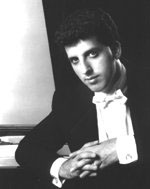 The career of pianist Jeffrey Biegel has been marked by bold, creative achievements and highlighted by a series of firsts. The career of pianist Jeffrey Biegel has been marked by bold, creative achievements and highlighted by a series of firsts.
He performed the first live internet recitals in New York and Amsterdam in 1997 and 1998, enabling him to be seen and heard by a global audience. In 1999, he assembled the largest consortium of orchestras (over 25), to celebrate the millennium with a new concerto composed for him by Ellen Taaffe Zwilich. The piece, entitled 'Millennium Fantasy for Piano and Orchestra', was premiered with the Cincinnati Symphony Orchestra. In 1997, he performed the World Premiere of the restored, original 1924 manuscript of George Gershwin's 'Rhapsody in Blue' with the Boston Pops. Charles Strouse composed a new work titled 'Concerto America' for Biegel, celebrating America and honoring the heroes and events of 9-11. Biegel premiered the piece with the Boston Pops in 2002. He transcribed the first edition of Balakirev's 'Islamey Fantasy' for piano and orchestra, which he premiered with the American Symphony Orchestra in 2001, and edited and recorded the first complete set of all '25 Preludes' by Cesar Cui.
Currently, he is assembling the first global consortium for the new 'Concerto no. 3 for Piano and Orchestra' being composed for him by Lowell Liebermann for 2005-06-07. The World Premiere will take place with the Milwaukee Symphony Orchestra, conducted by Andreas Delfs on May 12-14 2006, followed by the European Premiere with the Schleswig Holstein Symphony Orchestra, conducted by Gerard Oskamp, February 6-9, 2007.
Biegel is currently on the piano faculty at the Brooklyn Conservatory of Music at Brooklyn College, at the City University of New York (CUNY) and the Graduate Center of the City University of New York (CUNY).
|
|
|
|
|
|

Sunday, February 12, 2006
Reflecting on Mark Swed's 'Appassionata' article
The following is an excerpted letter re-printed in the Los Angeles Times. I was deeply moved by Mark Swed's article on February 5th in the LA Times and sent him a personal letter. The editor's asked if I wouldn't mind if they decided to print some of the letter. Here is it:
February 12, 2006
A pianistic passion
MARK SWED'S article regarding the "Appassionata" is magnificent ["Appassionata Unleashed," Feb. 5]. I was born deaf, and after surgery at age 3, I gravitated to the piano. When I was 5 or 6, my first recording was that of the great Horowitz — Beethoven's "Appassionata" with the D-major sonata, Opus 10, No. 3. Even then, I knew the star of the LP was the "Appassionata." I said, "I want to do this."
The other great pianist, Rubinstein, also played the "Appassionata." Horowitz and Rubinstein — their names always went together. Who was the poet, who was the pianistic genius? For me, they were one and the same.
Why the "Appassionata"? It was the essential piece in the pianist's repertoire. It was Beethoven at his best — fire, passion, lyricism, spirituality, the religious slow movement with its variations on a chorale, and the tempestuous last movement. It was indeed the "Appassionata" that Horowitz recorded in the 1960s to set a benchmark for pianists — and it did.
It is fantastic to see this sonata coming back into pianistic vogue. It is thrilling to see young pianists wishing to devour its passion and fury.
JEFFREY BIEGEL
Lynbrook, N.Y.
posted by Jeffrey Biegel
8:45 AM
|
| |



